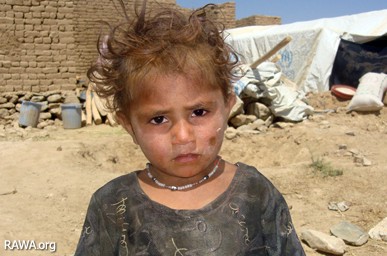GENEVA — Children in Afghanistan are increasingly at risk as the country's security situation deteriorates and the central government's authority is weakened, the United Nations Children's Fund said on Thursday.

September 2007: Khalida, 4, and her family were expelled from a refugee camp in Pakistan four months ago, now they are living in terrible situation near Kabul.
The conflict between Taliban insurgents and multinational forces, the increased use of suicide bombings and attacks on schools, mean that Afghanistan's children "are probably more at risk now than they have been since 2002," said Martin Bell, UNICEF UK's ambassador for humanitarian emergencies told journalists.
Bell hailed "great progress" in health, nutrition and education sectors in recent years, but warned the growing conflict between the Taliban and multinational forces risked turning the clock back 10 years.
"Despite a multitude of plans and proposals, projects and partners ... I have witnessed a spike in insecurity that is causing more and more schools to close and more and more children to be killed," Bell said in a new report.
US-led multinational forces invaded Afghanistan in the wake of the September 11, 2001 attacks to overthrow the Islamist Taliban regime, which provided a base for Osama bin Laden and other Al-Qaeda fighters.
Since 2001, there have been substantial increases in school enrolment with girls now comprising one-third of all pupils, up from around just three percent when the Taliban were in power.
However Bell warned that schools and teachers were facing increasing intimidation and attack by resurgent Taliban forces, who do not believe women should receive an education.
Some 44 schools have been forced to close in the first six months of 2007 alone, he said.
Bell also said the greater use of air strikes by US and other NATO forces inevitably increased the risk of civilian casualties.
His report cited the Afghanistan Independent Human Rights Commission as saying that neither side had respected the laws of armed conflict, and that children were now more vulnerable than at any time during the war.
Bell said that there could be "no long-term military solution," thus echoing views expressed by Britain's top military commander.
"There is a common misperception that the issues in Afghanistan ... can be dealt with by military means. That's a false perception," Air Chief Marshall Jock Stirrup told Britain's Sky News television.



